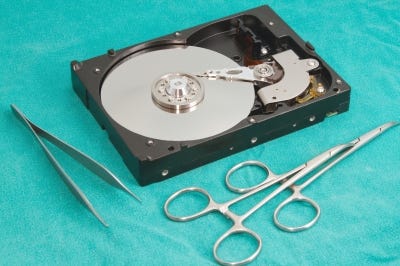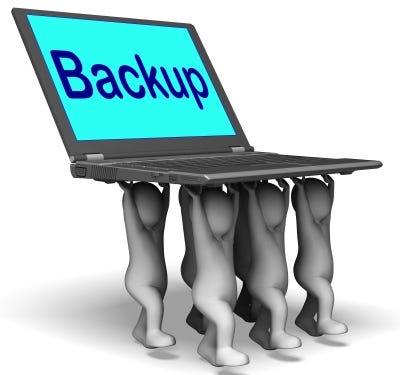Backing up data for a small sized business or company
Don’t be taken down by a data disaster.

You’ve worked extremely hard to build your small business, so you should do whatever you can to ensure its long term success, security and survivability.
Backing up your data may not be the most exciting subject, but it is of paramount importance. Next to having an effective antivirus, firewall and password management solution, ensuring that you regularly backup your data will do more to safeguard your business operations than anything else.
There are many backup solutions out there, providing lots of different functionality and protection. In this article we’ll look at the functionality that you’ll need from a backup solution and provide some useful software that you can try out so that you can get an effective backup solution in place.
We’ll explore:
- What does backup software do?
- Advantages and disadvantages of different types of backup
- The consequences of not backing up
- File sharing and syncing
- A comparison of backup software
- Download backup and sync software
Benefits from reading this article include:
- Learning why backing up your data is critical
- Understanding the benefits and different ways to backup data
- Learning how file sharing and syncing can help you
- Seeing a side by side comparison of the most popular backup solutions
- Downloading and trying out backup software for yourself

What does backup software do?
Simply put, backup software makes a copy of the data that you use in your business and stores it somewhere ‘safe’. That data might be financial spreadsheets, website files, documents, emails, images or anything else that you store on your computer or network.
Depending on the type of software you use, you might backup your data as follows:
- Locally, inside your computer — Backed up to your main internal hard drive or a separate internal hard drive
- Locally, to an external hard drive, USB stick or local storage device — This would be a separate drive or USB stick that you plug into your computer
- Online -Backed up to a remote location, in the cloud or on your backup service’s servers
Just backing up locally is seldom a good idea. If a virus infects your computer, you have a hardware failure or some disaster damages your computer equipment, both your original data and the local backups you are using could be damaged or destroyed. A combination of local backups and backups to an online service are definitely the best way to ensure that your data is properly protected.

What are the consequences of not backing up?
It can be catastrophic for your business. Imagine if you suddenly and irrevocably lost all of your business data; not just files or other assets that you might work on for clients, but your invoices, cashflow information, reports, website data, emails and a host of other information.
It’s been estimated that between 60% and 90% of businesses fail after a security breach or data failure where they did not back up their data. Losing all of your data can cause irreparable reputational damage and require a great deal of rework, time, money and effort to sort out.
What about file sharing and syncing?
Some backup solutions that store your files online also allow you to share files with others, providing you have granted them access by providing the login and password that they need.
This means that not only are your files backed up, but also that you can easily share files with someone else or synchronize them across multiple computers and locations.
How does the software know which files to backup?
It depends on the backup solution that you are using. Some software allows you to specify exactly what files on your computer you do or don’t want backed up (for example, everything in ‘My Documents’). Other software backs up everything that you put in a specific folder. Additionally, some backup solutions also take a ‘System Snapshot’, this means that in the event of failure, you can restore your computer exactly as it was at a previous point in time.

Its very important to double-check that you are backing up everything that you need to | Source
There are several things you should be doing on a regular basis to keep your data safe and secure:
- Check your backup settings on a regular basis
- Pay close attention to exactly what you are backing up
- Backup in more than one place
- Make sure you have enough storage space
- Don’t neglect other parts of your computer security
- Pay attention when deleting local files
1. Check your backup settings regularly
You’ll want to reassure yourself that all of your business files and data are being safely and securely backed up. Check all of your settings regularly including what’s actually being saved to your backup locations to ensure that your important data is protected.
2. Pay attention to what you are backing up
It’s important to backup any data that you can’t do without; you don’t need to backup everything on your computer, but do ensure that you backup all of your key data. Go through all of the folders where you save information to make sure that your backup software is aware of and backing up the files.
3. Backup in more than one place
Using a combination of local and online backup means that you’ll have more than one copy of your data in case anything goes wrong. Setup your online backup solution as soon as you can so you don’t need to worry about it.
4. Make sure you have enough storage space
If you have a lot of files, or quite large files, it can be easy to go up to your quota (if there is one). Make sure you have enough storage to meet your needs and pay for expanded storage if you need it.
5. Don’t neglect other parts of your computer security
It’s vital to combine backing up with a good antivirus and firewall solution for your business. Don’t skimp on your malware protection, firewalls or password management. The aim is never to get into a situation where you need to use your backup.
6. Deleting local files when using online backup and syncing software
Online syncing software is very good; however, be aware that when you delete a file locally it will also result in it being deleted or moved into a ‘deleted items’ folder online.
Any time that you spend setting up a backup solution will be well spent. Ensuring you are able to speedily recover your data will mean you can get up and running quickly in the event of a disaster.
Advantages and disadvantages of different types of backup
The image below shows you what the advantages and disadvantages are of the various different types of backup solution.
- Check what you are backing up
- Backup in more than one place
- Check how frequently you are backing up
- Check when you are backing up
- Have good all round security
- Check where you are backing up to
- Test the integrity of your backup

Local backup software
This software backs up locally to an internal or external hard drive or other local storage device.
- Windows backup– Installed as part of the Windows Operating System, this software (available via the control panel) will locally backup the files you choose to an internal or external hard drive, on a schedule determined by you; Windows Backup will also take a ‘system snapshot’, allowing easy restore of your whole system
- Crashplan– In addition to offering secure online backup, Crashplan will also allow you to backup locally; free backup is generally available for personal use only
- Mozy — Mozy allows you to store information locally as well as providing online backup; free backup is generally available for personal use only
Online backup software
This software backs your files up online and can also back your files up locally.
- Crashplan– In addition to offering local backup, Crashplan has very effective online backup; this will incur a fee, but is good value for money
- Mozy — Mozy allows you to backup a limited amount of data (2 GB) online; more storage is available (and recommended) for a fee
Online backup, file sharing & syncing software
This software will back your files up online and allows them to be shared and synchronized between multiple users or computers.
- Google Drive– Google Drive will synchronize and keep online copies of all the files that you store in your local Google Drive folder; it also features easy access with Google Docs and multiple user collaboration when working on files in the cloud
- Dropbox– A very popular online sharing and backup service; Dropbox will store and share anything that you place into your local Dropbox folder; very well supported by other programs and applications
- SugarSync– A very good online backup and sharing solution; SugarSync allows you to choose exactly which folders you want to backup, stores copies of the files online and shares them across your other computers
- Box — A popular choice for businesses, Box provides backup of multiple folders and synchronization across multiple devices
If you know of any other effective, free backup solutions, please share them in the comments.







Comments
Post a Comment